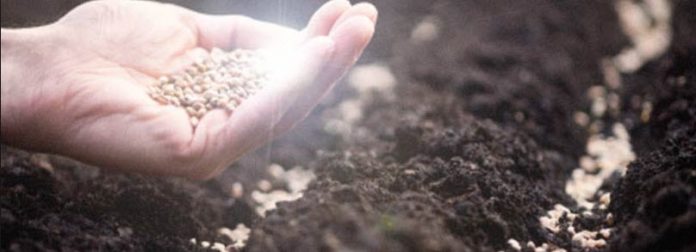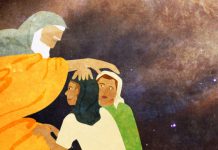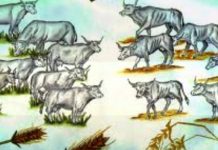“I can identify all the Jewish children in two minutes,” proclaimed Rabbi Eliezer Silver. His long beard and crisp, new army uniform were an odd sight in the Krakow Monastery.
“In two minutes? Impossible!” declared Father Hugo. “These children came to us as infants and do not have the slightest hint that they are Jewish. If you can identify them, you may take them!”
With a grin on his face, the good rabbi continued, “Then you will allow me two minutes tomorrow at lunch time?”
“No problem,” replied Father Hugo. And the rabbi was gone.
Rabbi Silver had arrived in Poland immediately at the end of World War II, determined to somehow locate and extract the hundreds (if not thousands) of Jewish children in monasteries across Europe. Their parents had placed them with non-Jewish families – who then decided to minimize their risk by sending them to monasteries.
In Krakow, Rabbi Silver had information that 30 Jewish children were in one particular monastery, and he was determined to obtain their release.
The following day at noon, he stood in the dining room of the monastery, facing 100 children in the middle of lunch, gazing at him curiously. The rabbi put his hand over his eyes and cried out the words of the “Shema”: “Hear O Israel, the Lord our God, the Lord is One!”
Immediately, 30 little children began crying, “Mama! Mama!” What the rabbi knew (but the priest didn’t) was that the last memory these children had of their mother was reciting together with them the most famous Jewish prayer.
“These are the Jewish children,” proclaimed the rabbi.
“You may take them,” replied the father. And another 30 children were then reunited to their heritage.
Last week’s Parsha had the first paragraph of the Shema, and the end of this week’s Parsha has the second paragraph. The Jewish people have lived and died with the Shema throughout their history.
____________
IN THE HEEL
In our Parsha, the Torah promises material benefits for following the Mitzvot, and does not expressly mention “Heaven and Hell” (concepts which Christians and Moslems borrowed from Jewish thought). Life’s benefits are not meant as a reward in and of themselves, but rather as the means to be able to continue following the Torah.
In the opening verse of our Parsha, the Torah refers to this as “following in the heel” of the Mitzvot. The Talmud comments on the use of the word “heel,” saying that many Mitzvot are performed by various body parts. For example, Tefillin are worn on the head and arm (it’s like taking your spiritual blood pressure!), the Tallit surrounds the upper body, we wash our hands in the morning and before eating bread, and we enter the Sukkah with our feet.
There are also Mitzvot that we do with the “heel” of our foot – a metaphor meaning that “we step on them,” treating them as insignificant.
Yet ironically, it is the minor details of any Mitzvah that gives it its special power. The lesson of our Parsha is that if we guard the “heel” – those Mitzvot that are less meaningful to us – that will bring us all the blessings of God.
____________
NOT ON BREAD ALONE
People live on bread, right? The Torah answers: “Only on the word of the Almighty does man exist.”
Moses describes the Jews’ supernatural existence in the wilderness. They ate manna, had a portable water supply, and their clothes and shoes never wore out. What was this intended to teach? “Not on bread alone does man live!”
The physical world is merely a container for the spiritual. Our physical bread contains spiritual nourishment as well. In the desert, the Jews were deeply connected to spirituality.
____________
A GOOD LAND
The Land of Israel, with all its material bounty, was meant to be a continuation of the spiritual existence in the desert. The Torah promises that you will enjoy an abundance of wealth, springs of water, fruits of the land, iron and copper. (There must be oil somewhere as well!)
“You shall eat and be satiated and bless the Lord for the good land He has given you” (Deuteronomy 8:10). The goal of the 40 years in the desert was not to live with constant miracles; as we see by entering the Land of Israel, God wants us to live natural lives. The point is to be aware of all the miracles in nature and grow closer to the Creator.
____________
FRUIT OF THE LAND
The Torah praises Israel as a land of 7 species: wheat and barley (a total of 5 grains including spelt, rye and oats), olives, dates, grapes, figs, and pomegranates (a total of 5 fruits). These fruits have a preferred status over other fruits in the blessings before and after eating them.
In Jewish law, these fruits are used as standard measurements. Rabbi Hirsch writes that in ancient times, the standard measure was a Palestinian olive or grape, which were very large.
____________
EAT AND BLESS
“Grace After Meals” is required by the Torah (as opposed to other blessings that are rabbinical). The strict requirement to bless after meals is only if one is totally satiated from the meal. The Jewish people, however, accepted upon themselves (and it subsequently became rabbinic law) that even after eating a piece of bread the volume of an olive, one must thank the Almighty and say Grace After Meals.
This is a long prayer which thanks God for feeding the entire world, and requests the rebuilding of the Temple and Jerusalem, and the reestablishment of the kingdom of David along with the coming of the Messiah, etc.
What is the reason for this long Megillah? All because a Jew ate a piece of bread the size of an olive?! Indeed, this is a great accomplishment. The process of turning wheat into bread is very complex, and we appreciate God “Who brings forth bread from the ground!”
____________
MY POWER AND THE STRENGTH OF MY HANDS
Moses warns against falling into the trap of always giving yourself the credit. “I did it! I made it! Wow, am I smart!” If you give yourself all the credit and forget God, He will leave you on your own, and the results will be tragic. Don’t forget that God gave you the brains and the ability – and be constantly aware of His assistance.
I once saw a postcard with the picture of an Israeli soldier holding a machine gun, under which was the verse, “Behold, He does not sleep or slumber, the Guardian of Israel!” The “Guardian of Israel” is not the soldier or the machine gun (although they are a necessary effort for security), but rather God Himself. This is the proper Jewish perspective of life.
____________
AND NOW, ISRAEL
Until this point, all the books of the Torah refer to the Jews as “the Children of Israel.” The book of Deuteronomy, however, often refers to just plain “Israel.” This refers to the Jewish people as one whole unit. (Rabbi Hirsch)
____________
ONLY TO FEAR
“What does God desire from us?” asks the prophet. “Only to fear Him!”
Everything is ordained in Heaven, except the “fear of Heaven.” This is the concept of “free will,” which is what gives meaning to life. Without free will, we are only intelligent robots!
The sages say: “The path that a person chooses, so he is led.” If a person comes to do positive things, he will find tremendous assistance from Above. If he comes to do negative things, he will find all the doors open and every opportunity for evil will present itself. Our choice is simply which path we choose to take.
The rabbis ask: Is fear of Heaven so easy to obtain? They answer that for Moses it was very easy because he had a great awareness of God.
Question: Just because it was easy for Moses, does that mean it is easy for us?
Answer: For the generation that saw Moses and felt the closeness of the Almighty’s presence, it was also easy. For us, it is more challenging.
Question: How can we obtain that awareness?
Answer: In this same verse, the Sages find a hint that one must make 100 blessings each day. Blessings are an important tool to help us get the most out of life. They teach us how to focus on what we have, rather than on what we lack. (Don’t try to keep up with the Cohenses!)
If we learn how to focus on the pleasures in life (a nice day, enough to eat, family, friends, a job, etc.) instead of the pain (stomachache, headache, toothache, depression, inferiority complex, etc.), we would find a pleasant and serene world to live in. When we realize that we have everything we need, life becomes a string of simple pleasures.
When a Jew awakens and recites the morning blessings, it’s like opening up a batch of birthday presents. Thank God I can see! I can walk! I have clothes! God gave me this apple! God gave us this Mitzvah! What a pleasure!
Reminding ourselves 100 times a day to appreciate that which we tend to take for granted is the key to a happy life.
____________
NOT LIKE EGYPT
The Torah contrasts the Land of Israel with Egypt. Egypt had the great advantage of the Nile river delta which periodically overflowed its banks. By building irrigation ditches, the Egyptians were able to divert water to the crops.
This system has a plus and a minus. The plus is a constant water supply without worry of draught. The minus is the substantial expenditure of resources needed for the project.
The Land of Israel, by contrast, was watered by rain alone. This too had a plus and a minus. The plus was that your crops were watered automatically, without effort. The minus, however, was there was no contingency plan if it failed to rain.
____________
THE EYES OF GOD ARE UPON IT
The Kabbalists teach that all nations have a guardian angel who is the intermediary between them and the Divine flow that sustains them physically and spiritually. Yet the Land of Israel is unique in that “the eyes of God are upon it from the beginning until the end of the year” (Deut. 11:12). This implies that in Israel, one can feel a special closeness and relationship with the Almighty, incomparable to any other place in the world.
____________
SECOND SECTION OF SHEMA
At this point, the Torah spells out the conditions of our relationship with God and the Land of Israel. We recite the Shema twice a day because it is so fundamental to Judaism: “If you (plural) will fulfill my commandments and love the Almighty (in actions and emotions), then you will receive rain in its proper times. However if you choose to forsake the Torah (and the choice is yours!), then I will seal up the heavens and there will be no rain. You will be lost quickly from this good land that I am giving you.”
Unfortunately, this sad prophecy was fulfilled twice in Jewish history with the destruction of our Holy Temple and our exile from the land. This is a lesson for all generations. Our weal and our woe depends on our relationship with the Almighty through fulfilling His Torah.
____________
GUARD YOUR HEART
“Guard yourself lest your heart be seduced and you turn away and worship other gods” (Deuteronomy 11:16). We learn from this verse three vital lessons:
First, be aware that you have a “heart” (inner desire). People spend their lives unaware of this fact. Second, know that your heart has the capability of being seduced into all kinds of undesirable behavior. Third, know that you have the power to guard yourself from this seduction by focusing on the will of your Creator, via the Torah (heard from Rabbi Noson Wachtfogel zt”l).
Living a Torah life in the Land of Israel will ensure survival in the land “like the days of the heaven on the earth” – i.e. forever!
credit to aish.com












